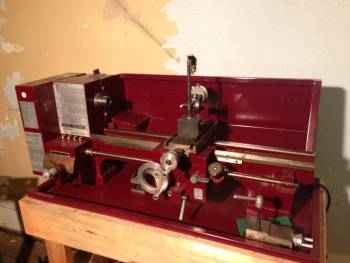9x20 Metal Lathe
| Status | Operational |
|---|---|
| Zone | Machine Shop |
| Owner | Tim Schmidt |
| Tool Type | Metal Lathe |
| Member Category | Full |
| User Manual | 9x20_lathe_manual.pdf |
| Manufacturer | Central Machinery |
| Model | T45861 |
| SOPs | Link |
| Checkout Required | |
| |
|
Description
9×20 Harbor Freight Lathe. This is a metric (by definition) lathe.
Specifications
| Swing Over Bed | 9“ |
|---|---|
| Swing Over Cross Slide | 5-5/16” |
| Distance Between Centers | 20“ |
Safety Rules
In addition to the general shop safety rules, the following are important points to remember when operating this machine.
- Wear short sleeve shirts, if possible, or shirts with snugly fitting cuffs if long sleeve. Loose sleeves can catch on rotating work and quickly pull your hand or arm into harm's way.
- Remove wrist watches, necklaces, chains and other jewelry. It's a good idea even to remove your wedding ring since it can catch on rotating work and severely damage your ring finger and hand.
- Tie back long hair so it can't get caught in the rotating work. Think about what happens to your face if your hair gets entangled.
- Always double check to make sure your work is securely clamped in the chuck or between centers before starting the lathe. Start the lathe at low speed and increase the speed gradually.
- Get in the habit of removing the chuck key immediately after use. Some users recommend never removing your hand from the chuck key when it is in the chuck. The chuck key can be a lethal projectile if the lathe is started with the chuck key in the chuck.
- Keep your fingers clear of the rotating work and cutting tools. This sounds obvious, but I am often tempted to break away metal spirals as they form at the cutting tool.
- Avoid reaching over the spinning chuck. For filing operations, hold the tang end of the file in your left hand so that your hand and arm are not above the spinning chuck.
- Never use a file with a bare tang - the tang could be forced back into your wrist or palm. Inexpensive wooden handles are readily available for common file sizes.
Contacts for training
Contact Carl Raymond or Brian Adams for training.
Safety Training
- Review of machine and shop safety rules.
- Proper procedures for securing parts / stock.
- Proper installation of cutting bits/tools.
- Proper operation and control of machine.
- Location, operation, and effect of all machine emergency stops.
- Proper procedures for cleanup.
Maintenance Record
- 5/2014 - Carl Raymond replaced the belt.
